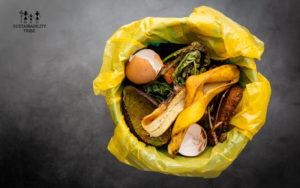Tribe, has it ever happened with you that when you are hosting a party, you were worried if the food will be enough for all the guests and then you ended up cooking a feast that can feed your entire residential community? It did happen with me once when I was still new to hosting parties and I actually ended up distributing food in my community. But that’s exactly what happens in many households during the holy month of Ramadan. When hosting Iftar many people cook excessive food to be hospitable to their guests and that causes increased food waste in Ramadan than the rest of the year.
However, Tribe, do you know how much is that increase in food waste during Ramadan? It’s is almost double the amount of regular food waste generated. In the UAE, around 38% of food prepared is wasted every day and during the holy month of Ramadan, this figure jumps to 60%.
According to Dubai Carbon, in Europe per capita, food waste is 1.2kg, in the UAE this figure reaches 2.7kg food waste daily but during Ramadan per capita, food waste in the UAE is a whopping 5.4kg a day.
Therefore this Ramadan, I am urging you to reduce food waste as part of Ramadan acts of kindness. This way you can show your kindness to mother earth and natural resource, at the same time kindness towards the world’s hungry people, 8.9% of the world’s population. Because every year, around 1.3 billion tons of food is wasted globally, only one-third of that can feed 870 million hungry people in the world. This month of giving, give back to the environment and society!
How to reduce Ramadan Food Waste?
1. SHOP MINDFULLY
Food waste reduction thinking should start when you are buying food or food ingredients. If you buy excessive food, more than you need or you can use, it will surely go to waste.
Firstly, never go food shopping on empty stomach, you tend to shop excessively. Better to create a shopping list and stick to it, instead of getting carried away by Ramadan deals and discounts. Even if you have a habit of buying bulk to reduce cost, follow a rule, never buy perishable food in bulk or more than you could consume. Read more in detail about how to smart shop, bulk or not in this article zero waste shopping.
2. STORING FOOD CORRECTLY
Only shopping smart is not enough to reduce food waste, you also need to acquire skills of extending the life of food ingredients you bought. For that, you need to learn about some food storage basics. However, if you have a habit of dumping everything in the fridge after your shopping trip then you should also make a habit of emptying the fridge before you go on your next grocery shopping trip. Read here about a great practice of Empty Fridge Day and the basics of storing food correctly.
3. COOK THE RIGHT QUANTITIES
Do you host Iftar at your home for your friends and family? Then one thing you can do to reduce food waste is asking your guests for RSVP confirmation so that you get an idea of exactly how many people are joining? Accordingly, you cook the food, not excess. For your Iftar spread, you can also strategize, which dishes you can make in smaller quantities and which dishes in larger quantities based on likings and how long the food can stay, can you use leftovers, etc.

You can always have some quick and easy solutions handy, if you need additional food, instead of cooking everything in excessive quantities. While we are talking about cooking, why not also think about low carbon dishes? Read our guide to sustainable eating.
4. PORTION SIZES
The food that is served on a plate, if not eaten gets wasted straight away. Therefore, it’s essential to serve the right portions of the plates. As a host, you can actually serve food to your guests and can ask them which dishes they like or don’t like while serving. That way you can control the portion size and reduce food waste. If that’s too difficult or not acceptable, you can surely control the portion size served on kid’s plates. Kids tend to serve themselves a lot of food which then they don’t finish off. If you want to include your family and friends in your fight against food waste, why not tell them about these best practices. Or you can have a decorative announcement displayed on your dining table, to give a subtle nudge, because it’s also a great opportunity to raise awareness.

5. LEFTOVERS
After hosting an Iftar, what do you do with your leftover food? One of the best things to do is pack the food and send it with your guests if they liked your food or particular dish. You can also distribute the food around you or to unprivileged people like your domestic help etc. the same day or next.
But one of the best things to do is reusing leftovers in the next meals, that way you can also challenge your cooking skills. Sometimes if the food is so delicious that your family wants to eat it again the next day. Just make sure to store leftovers safely. You can also freeze some leftovers and use them to make stews and soups. So try and look at your leftovers differently and reuse them.
6. TRACK FOOD WASTE
Especially because you are fighting against Ramadan food waste, why not start measuring your food waste? That way you can audit your food waste and work towards reducing food waste rest of the month. As long as you are able to reduce food waste over the holy month of Ramadan, you are learning some tips which you can use from the start during next Ramadan.
Measuring anything can help to create a goal, so don’t hesitate to measure your food waste and make a note for yourself.

7. DONATE FOOD
Ramadan is the best time to give back and donate, then why not donate food and feed someone? Here are some UAE-based organizations where you can donate food, UAE Food Bank, and Make my Meal. United Nation’s World Food Program has a ‘Share the meal‘ app that is international which is fighting to reduce world hunger.
8. COMPOST
Lastly, the biggest question what to do with the food waste during Ramadan? If you dump your food waste in the garbage bin, it ends up on landfill, decomposes, and releases Methan gas a highly potent GHG (greenhouse gas) that contributes to climate change. This is one of the biggest reasons why we should reduce food waste. But if you compost your food waste, you can avoid methane and actually help to create soil which is a carbon sink. So this Ramadan don’t just reduce the food waste but start composting. Here is our composting guide for more information. Or you can watch this video tutorial.
9. TAKE A SUSTAINABILITY CHALLENGE THIS RAMADAN!
Tribe, this month when you are devoting yourself to spiritual reflection and self-improvement, why not take a sustainability challenge and become our Change Ambassador? Join any category and complete all steps in this social education program to become Sustainability Tribe Ambassador and get sustainable rewards from our partners.

Ramadan Kareem to you Tribe, read here how to have a sustainable Ramadan.

